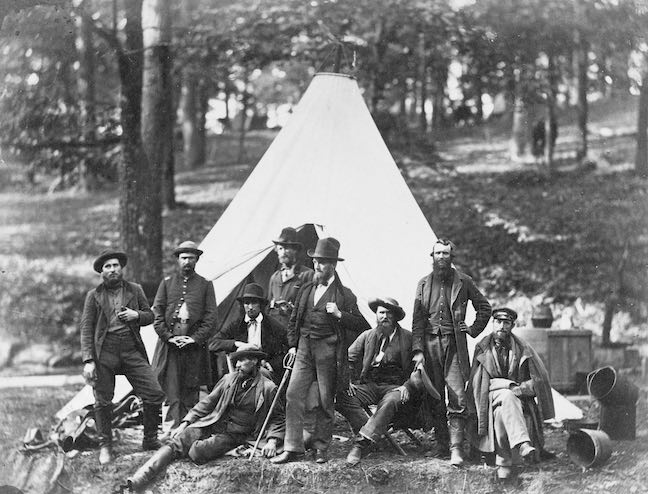| Credit: | by Gardner (Alexander) |
|---|---|
| Date: | 1862.10 |
| Negative Size: | 8 in. x 10 in. |
| Equipment: | bucket (wood); crate; folding stool; handgun; Sibley tent; scabbard; sword |
| Locations & Lines: | Berlin MD; Maryland |
| Military Units: | Bureau of Military Information (Secret Service); US Army |
| Sources: | Library of Congress; National Archives; Smithsonian Institution; USAMHI – MOLLUS collection |
$6.99
File Details: AIKJm, 800 DPI, TIFF, Original Photograph, 41.2 Mb
Image ID: AIKJ
Gardners Photographic Sketch Book Of The War. Vol. 1, No. 28. Scouts and Guides to the Army of the Potomac. Berlin, October, 1862. The scouts of the army undergo more hardship and brave greater peril than any other class. Secrecy being their only safety, their heroic deeds pass unrecorded, and when the necessity for their services has ceased to exist, with rare exceptions the brave men are altogether forgotten. Volumes might be written of their heroic deeds, and the historian of the rebellion will have failed in his duty if he neglects to chronicle the instances of their great exploits. Every army had its scouts, but none proved more efficient than those of the Army of the Potomac. The individuals in this group were attached to the Secret Service Department of the Army of the Potomac when conducted by Major Allen Pinkerton Their faces are indexes of the character required for such hazardous work. Men of iron nerve and indomitable perseverence [sic], they braved the halter with perfect consciousness of their peril, and seldom failed in an undertaking. During the campaign of the army in front of Fredericksburg, they proved of incalculable value. Each man was provided with a pass from the Commanding General, written with a chemical preparation that only became visible when exposed to solar rays, and on the back of which was pencilled [sic] some unimportant memoranda, to deceive the enemy, should the scout fall into his hands. If captured, he could drop this paper, apparently by accident, without exciting suspicion; and if successful in his expedition, the pass, after a moments exposure to the light, enabled the bearer to re-enter our lines, and proceed without delay to headquarters. They generally passed as foragers within our lines, always coming in with vegetable, poultry, and the like, and with the enemy assumed such characters as the occasion might require. They were really spies, and often spent many days within the Confederate lines. The Union people of the South sheltered them, and furnished information that frequently led to the discovery of the designs of the enemy in time to enable our commanding officers to wholly frustrate them. A number of the scouts were taken prisoners, some of whom were executed, while the survivors, scarcely less fortunate, wasted in cells, long, weary months. A few are still retained in the employ of the Government, and have proved no less faithful servants in peace than when confronting the dangers that surround the military spy.
Man third from right, seated, resembles Alexander Gardner.

